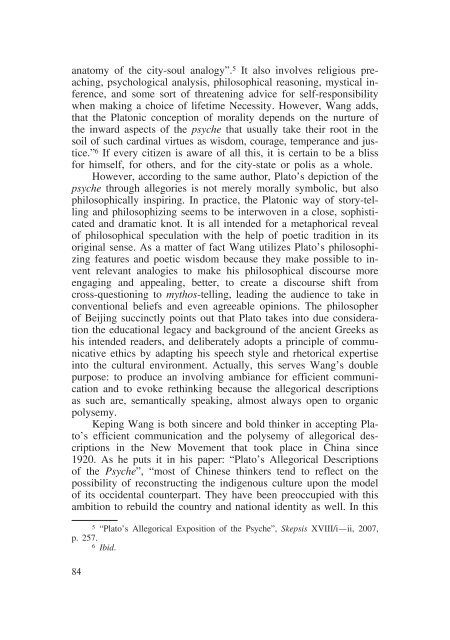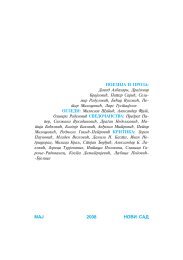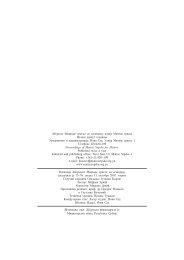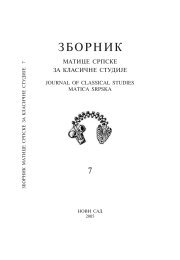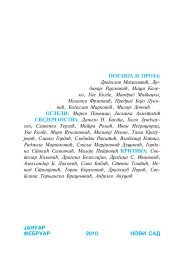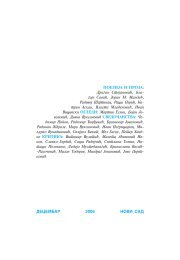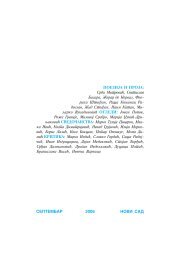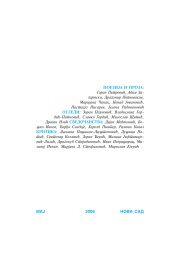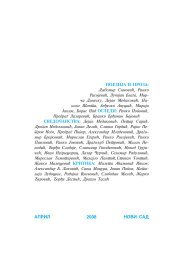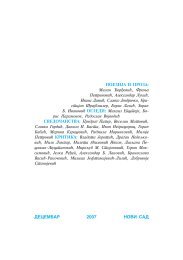Create successful ePaper yourself
Turn your PDF publications into a flip-book with our unique Google optimized e-Paper software.
anatomy of the city-soul analogy". 5 It also involves religious preaching,<br />
psychological analysis, philosophical reasoning, mystical inference,<br />
and some sort of threatening advice for self-responsibility<br />
when making a choice of lifetime Necessity. However, Wang adds,<br />
that the Platonic conception of morality depends on the nurture of<br />
the inward aspects of the psyche that usually take their root in the<br />
soil of such cardinal virtues as wisdom, courage, temperance and justice."<br />
6 If every citizen is aware of all this, it is certain to be a bliss<br />
for himself, for others, and for the city-state or polis as a whole.<br />
However, according to the same author, Plato's depiction of the<br />
psyche through allegories is not merely morally symbolic, but also<br />
philosophically inspiring. In practice, the Platonic way of story-telling<br />
and philosophizing seems to be interwoven in a close, sophisticated<br />
and dramatic knot. It is all intended for a metaphorical reveal<br />
of philosophical speculation with the help of poetic tradition in its<br />
original sense. As a matter of fact Wang utilizes Plato's philosophizing<br />
features and poetic wisdom because they make possible to invent<br />
relevant analogies to make his philosophical discourse more<br />
engaging and appealing, better, to create a discourse shift from<br />
cross-questioning to mythos-telling, leading the audience to take in<br />
conventional beliefs and even agreeable opinions. The philosopher<br />
of Beijing succinctly points out that Plato takes into due consideration<br />
the educational legacy and background of the ancient Greeks as<br />
his intended readers, and deliberately adopts a principle of communicative<br />
ethics by adapting his speech style and rhetorical expertise<br />
into the cultural environment. Actually, this serves Wang's double<br />
purpose: to produce an involving ambiance for efficient communication<br />
and to evoke rethinking because the allegorical descriptions<br />
as such are, semantically speaking, almost always open to organic<br />
polysemy.<br />
Keping Wang is both sincere and bold thinker in accepting Plato's<br />
efficient communication and the polysemy of allegorical descriptions<br />
in the New Movement that took place in China since<br />
1920. As he puts it in his paper: “Plato's Allegorical Descriptions<br />
of the Psyche", “most of Chinese thinkers tend to reflect on the<br />
possibility of reconstructing the indigenous culture upon the model<br />
of its occidental counterpart. They have been preoccupied with this<br />
ambition to rebuild the country and national identity as well. In this<br />
5 “Plato's Allegorical Exposition of the Psyche", Skepsis XVIII/i—ii, 2007,<br />
p. 257.<br />
6 Ibid.<br />
84


